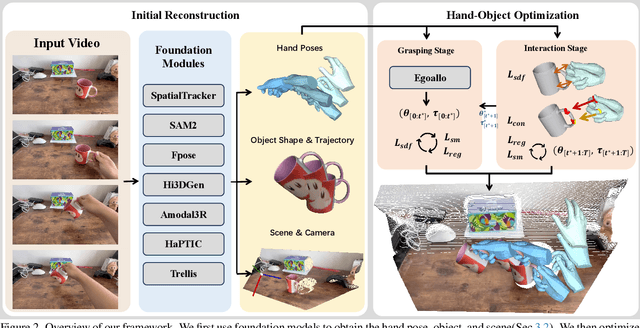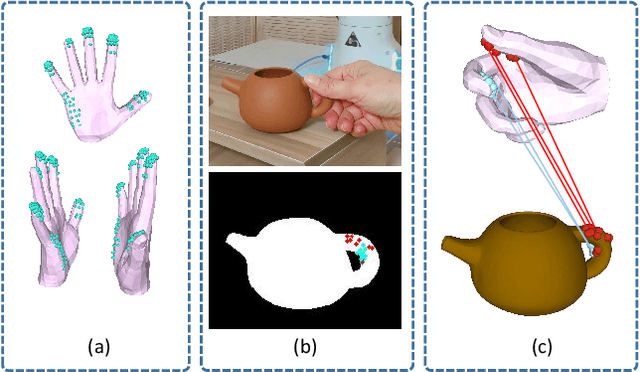Zhuoyang Pan
Zero-shot Reconstruction of In-Scene Object Manipulation from Video
Dec 22, 2025



Abstract:We build the first system to address the problem of reconstructing in-scene object manipulation from a monocular RGB video. It is challenging due to ill-posed scene reconstruction, ambiguous hand-object depth, and the need for physically plausible interactions. Existing methods operate in hand centric coordinates and ignore the scene, hindering metric accuracy and practical use. In our method, we first use data-driven foundation models to initialize the core components, including the object mesh and poses, the scene point cloud, and the hand poses. We then apply a two-stage optimization that recovers a complete hand-object motion from grasping to interaction, which remains consistent with the scene information observed in the input video.
Animal Pose Labeling Using General-Purpose Point Trackers
Jun 04, 2025Abstract:Automatically estimating animal poses from videos is important for studying animal behaviors. Existing methods do not perform reliably since they are trained on datasets that are not comprehensive enough to capture all necessary animal behaviors. However, it is very challenging to collect such datasets due to the large variations in animal morphology. In this paper, we propose an animal pose labeling pipeline that follows a different strategy, i.e. test time optimization. Given a video, we fine-tune a lightweight appearance embedding inside a pre-trained general-purpose point tracker on a sparse set of annotated frames. These annotations can be obtained from human labelers or off-the-shelf pose detectors. The fine-tuned model is then applied to the rest of the frames for automatic labeling. Our method achieves state-of-the-art performance at a reasonable annotation cost. We believe our pipeline offers a valuable tool for the automatic quantification of animal behavior. Visit our project webpage at https://zhuoyang-pan.github.io/animal-labeling.
SOAR: Self-Occluded Avatar Recovery from a Single Video In the Wild
Oct 31, 2024



Abstract:Self-occlusion is common when capturing people in the wild, where the performer do not follow predefined motion scripts. This challenges existing monocular human reconstruction systems that assume full body visibility. We introduce Self-Occluded Avatar Recovery (SOAR), a method for complete human reconstruction from partial observations where parts of the body are entirely unobserved. SOAR leverages structural normal prior and generative diffusion prior to address such an ill-posed reconstruction problem. For structural normal prior, we model human with an reposable surfel model with well-defined and easily readable shapes. For generative diffusion prior, we perform an initial reconstruction and refine it using score distillation. On various benchmarks, we show that SOAR performs favorably than state-of-the-art reconstruction and generation methods, and on-par comparing to concurrent works. Additional video results and code are available at https://soar-avatar.github.io/.
gsplat: An Open-Source Library for Gaussian Splatting
Sep 10, 2024Abstract:gsplat is an open-source library designed for training and developing Gaussian Splatting methods. It features a front-end with Python bindings compatible with the PyTorch library and a back-end with highly optimized CUDA kernels. gsplat offers numerous features that enhance the optimization of Gaussian Splatting models, which include optimization improvements for speed, memory, and convergence times. Experimental results demonstrate that gsplat achieves up to 10% less training time and 4x less memory than the original implementation. Utilized in several research projects, gsplat is actively maintained on GitHub. Source code is available at https://github.com/nerfstudio-project/gsplat under Apache License 2.0. We welcome contributions from the open-source community.
 Add to Chrome
Add to Chrome Add to Firefox
Add to Firefox Add to Edge
Add to Edge